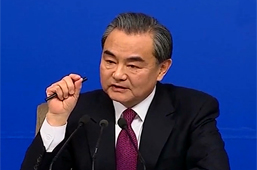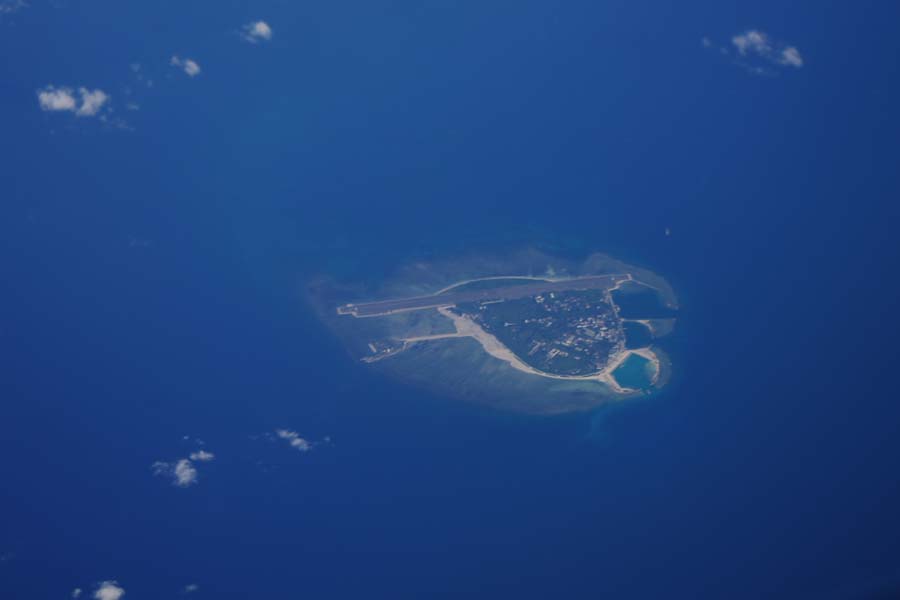BEIJING — The Foreign Ministry on June 8 issued a statement on settling disputes between China and the Philippines in the South China Sea through bilateral negotiation. Following is the full text of the statement:
Statement of the Ministry of Foreign Affairs of the People's Republic of China on Settling Disputes Between China and the Philippines in the South China Sea Through Bilateral Negotiation
(8 June 2016)
China and the Philippines are neighbors facing each other across the sea, and the two peoples have enjoyed friendship over generations. Before the Philippines' unilateral initiation of the South China Sea arbitration on 22 January 2013, the overall situation in the South China Sea had remained stable despite certain disputes between China and the Philippines therein. Thanks to China's efforts, China and the Philippines carried out friendly consultations on, among others, establishing dialogue mechanisms and engaging in practical cooperation and joint development, and have achieved positive outcomes in this regard. However, ever since its initiation of the arbitration, the Philippines has unilaterally closed the door of settling the South China Sea issue with China through negotiation, and has, while turning its back on the bilateral consensus regarding managing differences, taken a series of provocative moves that infringed upon China's legitimate rights and interests. This has led to dramatic deterioration of China-Philippines relations as well as of peace and stability in the South China Sea. China is firmly opposed to the Philippines' unilateral actions. China adheres to the solemn position of non-acceptance of and non-participation in the arbitration, and will stay committed to settling the relevant disputes with the Philippines in the South China Sea through bilateral negotiation.
I. It is the common agreement and commitment of China and the Philippines to settle their relevant disputes in the South China Sea through negotiation
China has all along stood for peacefully settling territorial and maritime delimitation disputes through negotiation with States directly concerned on the basis of respecting historical facts and in accordance with international law. On issues concerning territorial sovereignty and maritime delimitation, China never accepts any recourse to third party settlement, or any means of dispute settlement that is imposed on it. Territorial sovereignty issues are not subject to the United Nations Convention on the Law of the Sea (UNCLOS). With regard to maritime delimitation disputes, China made, pursuant to Article 298 of UNCLOS, an optional exceptions declaration in 2006, excluding disputes concerning, among others, maritime delimitation from the UNCLOS third party dispute settlement procedures.
It is not only the Chinese government's consistent policy, but also a clear agreement reached between China and the Philippines, to settle their relevant disputes in the South China Sea through negotiation.
The 10 August 1995 Joint Statement between the People's Republic of China and the Republic of the Philippines concerning Consultations on the South China Sea and on Other Areas of Cooperation states that "[d]isputes shall be settled in a peaceful and friendly manner through consultations on the basis of equity and mutual respect", and that "a gradual and progressive process of cooperation shall be adopted with a view to eventually negotiating a settlement of the bilateral disputes." Afterwards, China and the Philippines reaffirmed the consensus on settling the South China Sea issue through bilateral negotiation and consultation in a number of bilateral documents, such as the 23 March 1999 Joint Statement of the China-Philippines Experts' Group Meeting on Confidence-Building Measures and the 16 May 2000 Joint Statement between the Government of the People's Republic of China and the Government of the Republic of the Philippines on the Framework of Bilateral Cooperation in the Twenty-First Century.
On 4 November 2002, China and the ten ASEAN Member States signed the Declaration on the Conduct of Parties in the South China Sea (DOC), in which the Parties concerned solemnly "undertake to resolve their territorial and jurisdictional disputes by peaceful means, without resorting to the threat or use of force, through friendly consultations and negotiations by sovereign States directly concerned, in accordance with universally recognized principles of international law, including the 1982 UN Convention on the Law of the Sea".
Afterwards, China and the Philippines reaffirmed this solemn commitment they had made in the DOC in a number of bilateral documents, such as the 3 September 2004 Joint Press Statement between the Government of the People's Republic of China and the Government of the Republic of the Philippines and the 1 September 2011 Joint Statement between the People's Republic of China and the Republic of the Philippines.
II. China and the Philippines have never conducted any negotiation on the subject-matters of the arbitration initiated by the Philippines
According to the Philippines, China and the Philippines have engaged in a number of exchanges of views since 1995 on the subject-matters of the arbitration initiated by the Philippines but the disputes have remained unsettled, and the Philippines has good reasons to believe that it is meaningless to continue the negotiations and it therefore has the right to initiate the arbitration. The fact, rather to the contrary, is that the two States have by far never engaged in any negotiation on the subject-matters of the arbitration.
China and the Philippines have held multiple rounds of consultations on the proper management of disputes at sea, but have by far had no negotiation designed to settle the relevant disputes in the South China Sea. China has on a number of occasions proposed with the Philippines the establishment of a China-Philippines regular consultation mechanism on maritime issues; however, to date, there has never been any response from the Philippine side. On 1 September 2011, the two countries issued the Joint Statement between the People's Republic of China and the Republic of Philippines, reiterating the commitment to settling the disputes in the South China Sea through negotiation. Thereafter, China, for many times, proposed restart of the China-Philippines consultation mechanism for confidence-building measures, but this proposal has once again fallen on deaf ears. It is completely groundless for the Philippines to claim that it is meaningless to continue the negotiations, and that the Philippine side has had to initiate the arbitration.
III. The Philippines' unilateral initiation of arbitration goes against the bilateral agreement on settling the disputes through negotiation and violates the provisions of UNCLOS
The South China Sea arbitration was unilaterally initiated by the Philippines. In doing so, the Philippines has turned its back on the agreement reached and repeatedly reaffirmed by China and the Philippines on settling the relevant disputes in the South China Sea through negotiation and violated its own solemn commitment in the DOC. This is a violation of the principle of Pacta sunt servanda and an abuse of the UNCLOS dispute settlement procedures. It goes against international law, including UNCLOS.
First, by unilaterally initiating the arbitration, the Philippines has violated its agreement with China to settle the relevant disputes through bilateral negotiation. In relevant bilateral documents and the DOC, China and the Philippines have agreed to settle through negotiation their disputes in the South China Sea and reaffirmed this agreement many times. The above bilateral documents between China and the Philippines and relevant provisions in the DOC are mutually reinforcing and constitute a binding agreement, by which both sides have chosen to settle the relevant disputes through negotiation. The Philippines' breach of its own solemn commitment is a deliberate act of bad faith.
Second, by unilaterally initiating the arbitration, the Philippines has violated the right, as provided for in UNCLOS, of a State Party to UNCLOS to choose the means of dispute settlement of its own will. Article 280 of Part XV of UNCLOS stipulates that: "Nothing in this Part impairs the right of any States Parties to agree at any time to settle a dispute between them concerning the interpretation or application of this Convention by any peaceful means of their own choice." Article 281 of UNCLOS provides that: "If the States Parties which are parties to a dispute concerning the interpretation or application of this Convention have agreed to seek settlement of the dispute by a peaceful means of their own choice, the procedures provided for in this Part apply only where no settlement has been reached by recourse to such means and the agreement between the parties does not exclude any further procedure". Given that China and the Philippines have made an unequivocal choice to settle the relevant disputes through negotiation, and have excluded third party settlement procedures, including arbitration, the third party dispute settlement procedures stipulated by Part XV of UNCLOS is thus non-applicable in this regard.
Third, by unilaterally initiating the arbitration, the Philippines has breached Article 283 of UNCLOS regarding the duty of exchange of views. The Philippines deliberately misrepresents certain consultations with China on maritime affairs and cooperation, all of a general nature, as negotiations over the subject-matters of the arbitration, and uses this as an excuse to claim that bilateral negotiations have been exhausted. This is despite the fact that the two States have never engaged in any negotiation on those subject-matters. Such claim made by the Philippines is fundamentally contrary to facts, and must have been made with ulterior motives.
IV. China will adhere to the position of settling the relevant disputes with the Philippines in the South China Sea through negotiation
China is a major force for upholding peace and stability in the South China Sea. China is a staunch supporter of the purposes and principles of the UN Charter. It is committed to upholding and promoting international rule of law and shall always respect and act in accordance with international law. While firmly safeguarding its territorial sovereignty and maritime rights and interests in the South China Sea, China adheres to the position of settling disputes through negotiation and consultation and managing differences through relevant rules and mechanisms. China endeavors to achieve win-win outcomes through mutually beneficial cooperation, and is committed to making the South China Sea a sea of peace, cooperation and friendship.
On issues concerning territory and maritime delimitation, China does not accept any means of dispute settlement imposed on it; nor does China accept any recourse to third party settlement. The door of China-Philippines bilateral negotiation is always open. China will remain committed to settling through negotiation the relevant disputes with the Philippines in the South China Sea on the basis of respecting historical facts and in accordance with international law. China urges the Philippines to immediately cease its wrongful conduct of pushing forward the arbitral proceedings, and return to the right path of settling the relevant disputes in the South China Sea through bilateral negotiation with China.















